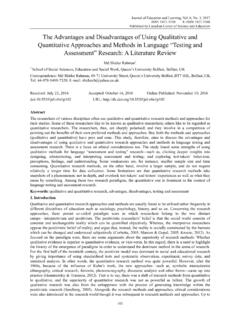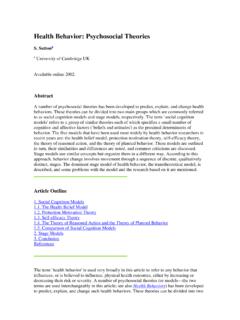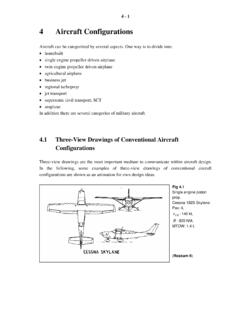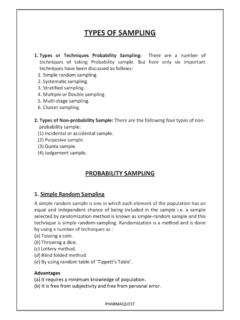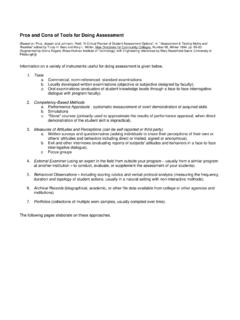Transcription of On the Advantages and Disadvantages of Subjective …
1 On the Advantages and Disadvantages ofSubjective Jahedi and Fabio M endez Department of EconomicsUniversity of ArkansasJune, 2013 AbstractThis paper utilizes data from a laboratory experiment in order to examine the ad-vantages and Disadvantages of Subjective measures and their use in empirical results indicate that Subjective measures correlate highly with the variables theyare designed to capture, but that they also suffer from several systematic biases relatedto the economic and cognitive contexts.
2 More importantly, our results suggest thatsubjective measures of broadly defined concepts convey additional information whichis complementary to that obtained from facts and that the use of these measures mayactually be preferable to the use of purely objective measures in some cases. Ironically,we find that Subjective measures may be most useful in exactly those situations wherethey disagree with their objective counterparts. We would like to thank the Sutton Fund and the University of Arkansas for financial support.
3 We alsothank Kristine Brown, Cary Deck, Ori Heffetz, Youenn Loheac, and seminar participants at the Universityof Arkansas for valuable comments. Xirong Chen provided excellent research assistance. All errors areours. Contact Info: Department of Economics, Sam M. Walton College of Business, Business Building 402,Fayetteville, AR 72701-1201, USA. Email: IntroductionSubjective measures are increasingly being used in empirical studies of many economic phe-nomena for which objective data is difficult to measuring corruption, hap-piness, racism, consumer satisfaction, or sexual behavior, for example, researchers resort tosubjective data because the objective variables of interest are either actively being hiddenby the parties involved, or are vaguely defined.
4 Subjective measures are often derived fromsurvey questions such as How satisfied are you with your life? or How violent is yourcity? , which ask respondents to assess the variable of interest. The use of these measuresfor empirical analysis, however, has been confronted with strong skepticism (as pointed outby Manski 2004) and open calls for the use of purely objective measures instead (Olken2009; Banerjee, Hanna, and Mullainathan 2012). It is thus, important to ask whether suchmistrust is main arguments against the use of Subjective measures can be found in the litera-ture.
5 First, Subjective measures have been shown to suffer from many systematic biases re-lated to order, scale and halo-effects (Podsakoff et al. 2003), psychological factors (Bertrandand Mullainathan 2001; Redelmeier et al 2003), macroeconomic fluctuations (Donchev andUjhelyi 2011), and others. Second, Subjective measures have been shown to be uncorrelated(and even negatively correlated) with independent, objective measures related to the vari-able of interest (Olken 2009; Razafindrakoto and Roubaud 2010; Kaplan and Pathania 2010;Hardoon et al 2003).
6 Third, Subjective measures are difficult to aggregate and interpretbecause they are often expressed in ordinal scales (Rose-Ackerman 1999).In this paper, we evaluate the validity of these arguments and examine the performanceof Subjective measures relative to that of objective measures. In doing so, we distinguishbetween two types of Subjective measures:generalandspecific. Specific Subjective measuresare derived from survey questions that ask about well-defined concepts that can be observedin principle such as the amount of money paid in bribes or the number of times you wereracially discriminated against.
7 General Subjective measures are derived from questions thatask about broad concepts, such as the level of corruption or the extent of racism, whichcomprise both explicit components that can be observed in principle ( bribes paid byprivate investors) and implicit components that cannot be observed ( investment projectsaborted in order to avoid bribes).1 Kahneman and Krueger 2006, for example, note the increased use of perceptions in studies of life-satisfaction. They report that while only 5 studies using Subjective measures were published between 1991and 1995, more than 100 similar studies were published between 2001 and 2005.
8 Others are also taking in 2005, the Gallup World Poll began maintaining a well-being index for 155 countries worldwidewhile in 2011, the United Kingdom decided to directly include some Subjective well-being questions as partof their annual Integrated Household distinction, as the paper goes on to show, is important for comparing the relativeperformance of Subjective and objective measures. Admittedly, when measuring well-definedconcepts, the use of objective data, if it exists, is preferable. Specific Subjective measuresprovide, at best, a noisy approximation of the facts.
9 When measuring broadly definedconcepts, however, the use of objective data may not always be preferable insofar as theobjective data overlooks implicit components relevant to the variable of racism in the workplace, for example, an objective account of the racist acts thattake place might not be as good as a general Subjective measure of the overall extent ofracism. To see this more clearly, think of an extreme situation in which racism is so strongthat it forces all minorities to leave a certain environment.
10 In that case, the total number ofracist acts observed would necessarily be equal to zero and would not provide a good measurefor the extent of racism that prevails. A general survey question, in contrast, may provide amore accurate representation if the respondents answers are sensitive to both explicit racism(racist acts that take place) and implicit racism (racist acts that would have taken place ifminorities had stayed in that environment).In order to conduct our study, we set up a lab experiment with crime from which weobtain the corresponding objective and Subjective measures necessary for our analysis.
